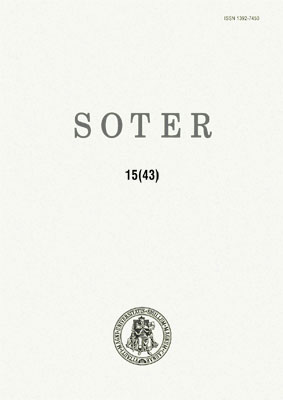Religinės savimonės atspindžiai xix amžiaus lietuvių poezijoje
Reflections of Religious Self-Awareness in Nineteenth-Century Lithuanian Poetry
Author(s): Aurelija MykolaitytėSubject(s): Christian Theology and Religion
Published by: Vytauto Didžiojo Universitetas
Keywords: religinė savimonė; bendruomenė; tėvynė; katalikų tikėjimas; lietuvybė; asmuo; religious self-awareness; community; homeland; catholic faith; lithunianism; person
Summary/Abstract: Šiame straipsnyje nagrinėjama religinės minties raida poetų kunigų Antano Strazdo (1760–1933), Kiprijono Zabičio-Nezabitauskio (1779–1937), Antano Baranausko (1835–1902), Antano Vienažindžio (1841–1892), Aleksandro Burbos (1854–1898), Jono Mačiulio-Maironio (1862–1932) kūryboje. Ką menininkai laikė svarbiausia? Kaip kiekvienas jų suprato žmogų Aukščiausiojo akivaizdoje? Nagrinėti vien kunigų kūrybą pasirinkta neatsitiktinai – jų literatūrinis palikimas yra kuo puikiausias to meto religinės savimonės liudytojas. This article analysed the evolution of religious thought in the poetry of Antanas Strazdas, Kiprijonas Nezabitauskas-Zabitis, Antanas Baranauskas, Antanas Vienažindys, Aleksandras Burba, Maironis. What is most important in their works?How they understood the human being in God’s presence? All these writers were priests of Catholic Church, and their literary heritage is the best witness of the religious self-awareness in nineteenth century. This investigation has espaliered the key characteristic of the Lithuanian religious poetry, chiefly the time spirit and how it is expressed in the artefact-poems typical of nineteenth-century. Analysis and comparison of the content and style of these poems illustrated time spirit in some different forms. The discussion established that in nineteenth-century, Lithuanian religious poets practised their art in some modes: massaging the data of the senses by salvaging theological references, repairing tensions by meshing constructions of the mind with theological affectivities, and sharing creatively appropriated experience, the truths of the heart, as an holistic reconciliation of tensions. We noted that artefacts of greater worth were recognised by inhabitants of Lithuania. Such poetry of heightened sensitiveness to time do inculturate universal, salvational themes. The analysis of Strazdas’, Nezabitauskis-Zabi-tis’, Baranauskas’, Burba’, Maironis’ works shows that religious poetry of nineteenth-century was affected by historical and cultural movement. So the evolution of religious thought could be define by this words – community, homeland, Catholic Church, nation and individuality.
Journal: SOTER: religijos mokslo žurnalas
- Issue Year: 43/2005
- Issue No: 15
- Page Range: 203-213
- Page Count: 11
- Language: Lithuanian

